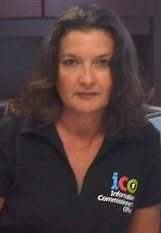Archive for March 21st, 2011

CITA calls for dedicated ‘tourism cops’
 (CNS): The private sector body which represents the tourism industry has called on the RCIPS and the Cayman Islands Government to consider the implementation of a dedicated tourism police service. The Cayman Islands Tourism Association said the request is being made as it believes there is a need for the destination to maintain the safe environment that the industry promises to visitors. The body said it had a number of ideas about such a service and how it could focus on the needs of visitors and tourism business-owners alike to re-establish confidence in the tourism product. CITA said the tourism economy would be permanently damaged if a tourist gets seriously harmed and they were seeking ways to prevent that from happening.
(CNS): The private sector body which represents the tourism industry has called on the RCIPS and the Cayman Islands Government to consider the implementation of a dedicated tourism police service. The Cayman Islands Tourism Association said the request is being made as it believes there is a need for the destination to maintain the safe environment that the industry promises to visitors. The body said it had a number of ideas about such a service and how it could focus on the needs of visitors and tourism business-owners alike to re-establish confidence in the tourism product. CITA said the tourism economy would be permanently damaged if a tourist gets seriously harmed and they were seeking ways to prevent that from happening.
“In addition to such an alarming potential incident there are already an unsettling number of complaints by long-standing visitors who no longer wish to stay here. Potential and existing investors are also faced with growing concern about the lack of control that RCIPS seems to have within the community,” CITA said in its statement.
The organization said it envisioned that a dedicated tourism police sector could advise and assist tourists during typical activities, such as beach use and safety, undertake late-night patrols near restaurants, bars and accommodations to assure their safety, and make sure guests have a pleasant, memorable stay.
CITA asked for the positioning of dedicated tourism police in areas identified for potential risk or vulnerability, including GeorgeTown, Seven Mile Beach, West Bay and the Eastern Districts. It also said the uniformed officers should be clearly identified as Tourism Police to help with the safety of our visitors.
The body said these officers could offer quick action and investigation of any tourist safety complaints (including registering of complaints and providing police reports in the case of personal injury, theft or loss of items) and providing information on travel security and vacation safety to visitors.
Maintaining a safe environment in tourist areas and ensuring a hassle-free vacation, creating a sense of security during all hours of activity and assisting tourists with concerns may help to address the growing concerns that Cayman is no longer the safe destination it once was.
LA committees fail to meet
(CNS): Having been denied the opportunity to respond to the premier’s comments in the Legislative Assembly last week over his resignation from the Public Accounts Committee, the former chair delivered a statement to the press on Monday morning hitting back at the criticisms. Miller also pointed out that while he may have only succeeded in getting PAC to meet 17 times out of 30 attempts, that was still 17 times more than most other parliamentary standing committees have ever met. Since the government was elected in May 2009, most of the other committees, such as the one overseeing the complaints commissioner and the register of members’ interests, have never met to carry out their functions as set out in the rules of the Legislative Assembly.
At the same time that Miller was appointed chair of the PAC, which he said had achieved at least some moderate success, the Legislative Assembly also elected various other chairs to a number of committees, and aside from the business committee, which deals with the agenda for each of the sittings of the Legislative Assembly, no other committee has been convened by the relevant chair. The standing orders make it clear that the committees should meet regularly and publish a report at the end of each session.
Elio Solomon was elected to serve as chair of the Register of Interests Committee but has never called a meeting. This committee is one of the most important committees of the country’s parliament as it is supposed to examine potential conflicts of interests of members and government ministers to ensure that their private interests are not encroaching on their role in parliament. It is supposed to issue a report at the end of every parliamentary session, like other committees, updating the public on the state of the register of interests.
However, since it was established the committee has never met and therefore has not produced a report about its work during the first session of parliament, despite the fact that the second session of parliament is also about to come to a close shortly.
Dwayne Seymour was elected chair of the House Committee, which looks after the needs of members, but he has never convened a meeting, and Cline Glidden has never called a meeting to examine the reports and work of the OCC either and neither of these committees have produced a report of their work (which they have obviously not conducted as they have never met) in accordance with Standing Orders.
Although Finance Committee,which consists of all members and is chaired by the premier, has met during the budget sessions in order to vote on appropriations for government spending, it has never met outside of a budget session to address the many changes to appropriations and executive spending that have occurred.
“I would suggest that the only two committees that are not in violation of the standing orders are the PAC and the Business Committee,” Miller said, as he asked the public to make their own decisions about which chairmen took their job seriously and “who could handle a committee and move the work forward.”
In the wake of denials by McKeeva Bush that even in his role as minister of finance that he was not able to make chief officers comply with the law regarding government accounts, Miller said it clearly states in the Public Management and Finance Law that he is. Quoting the PMFL, Miller pointed to clause 36, which states that a chief officer shall comply with any direction given by the minister of finance which he considers necessary to protect government’s financial interests.
The former chair also revealed that in the wake of his resignation the premier had called him and asked him to reconsider his decision and offered to change up the committee membership. However, Miller said, despite his agreement to consider that, nothing further was said over the weekend in the wake of comments by the premier’s counsellors that Miller was a failure. The independent member said no suggestions were put to him in the LA but instead the premier created a “hoopla of misinformation through his spin doctors”, accusing him of not being able to do the job, despite his evident continuous efforts to address the public accounts situation.
Miller said, however, that he was not surprised government had opted to shoot the messenger rather than deal with the message, but he was disappointed that the time was taken in the Legislative Assembly to criticize him rather than elect a new chairman of the committee.
The former chair said that his decision to resign was not an easy one but he felt he had no other option to force the government and the public to focus on moving the important work of the committee forward. He said he had handed in his resignation to give the premier time to appoint a new chair at the last meeting and the country needed to take note that government has now said it would be at least two months before it intends to appoint a new chair.
See Miller’s full statement over the PAC affair below.

FOI boss calls for government support
 (CNS): The head of the Freedom of Information Office has chastised the Cayman Islands government for not supporting her agency’s efforts to improve public-sector transparency as provided under the FOI Law. Information Commissioner Jennifer Dilbert spoke of her struggle to achieve this support during last week’s UCCI’s leadership conference. Dilbert said her office is “struggling to achieve” official support, while working to educate the public on the various means of access to information and encourage people to use the law. “There has to be a political and bureaucratic willingness to embrace a culture of openness and proactive disclosure,” she told the packed room at a seminar on the subject of Media, Freedom of Information and Governance.
(CNS): The head of the Freedom of Information Office has chastised the Cayman Islands government for not supporting her agency’s efforts to improve public-sector transparency as provided under the FOI Law. Information Commissioner Jennifer Dilbert spoke of her struggle to achieve this support during last week’s UCCI’s leadership conference. Dilbert said her office is “struggling to achieve” official support, while working to educate the public on the various means of access to information and encourage people to use the law. “There has to be a political and bureaucratic willingness to embrace a culture of openness and proactive disclosure,” she told the packed room at a seminar on the subject of Media, Freedom of Information and Governance.
The seminar was on the second day of the conference, which included panels on topics ranging from education issues to the Public Management and Finance Law to e-governance to empowering women.
In her session Dilbert addressed her concerns with government’s apparent reluctance to embrace FOI at a seminar on Media, Freedom of Information and Governance, saying her office is “struggling to achieve” official support, while working to educate the public on the various means of access to information and encourage people to use the law..
“It’s not good enough for government to honour the Freedom of Information Law in principle, while limiting its potential in practice by not providing the infrastructure necessary to comply with the law. My struggle is to make sure that we get what we need to enforce the law,” she said.
Since the FOI Law came into effect 5 January 2009 through to the end of 2010, Dilbert said 1,424 requests for information had been filed, “which is not bad for a small place. We don’t know whether more is success. In a lot of cases, if you think about it, more requests doesn’t necessarily mean success; less requests can mean success because what we are trying to do is to get government to put information out there.”
Citing some success with public-sector agencies putting minutes of their meetings on their websites voluntarily, she added that the “threat, hopefully, of my office standing over you is that public authorities are thinking a little bit more about their actions because they know that there is going to be more transparency and more accountability, and that really is what the law is all about.”
Dilbert also pointed out that, while the Information Commissioner’s office is supposed to be independent, it is funded by government, so it is difficult to be fully independent.
“I do fall under too many of the government’s procedures and policies and moratoriums and budget issues and time-recording issues. These are things that affect the independence of my office. It’s a constant struggle for me to assert that independence and say to government, ‘I am following this law. This is what I’m doing and I’m not going to stop doing it …’”
She called for across-the-board political and public-sector recognition of the importance of access to information. “There also needs to be a culture change across the Cayman Islands. We need buy-in by senior civil servants and politicians. Full disclosure of information to the public about government activities means more accountability within government, which should ultimately lead to a more efficient and effective public service.”
Dilbert pointed out that conditioning officials to FOI would result in a faster response to requests for information. “FOI is like a muscle; if you don’t use it, it gets weak,” she said, adding, “Each time a requester wins an FOI battle, it paves the way for everyone who follows.”
Other participants in the panel included former Government Information Service head Pat Ebanks, who spoke about the evolution of GIS and balancing the need to inform the public with its responsibility to the government.
“(Government) information people are civil servants and they are paid to work for the people, to serve the people. I’ve always felt that we had a responsibility not just to government but to the people. I feel that that is the ideal position that we need to take in GIS,” Ebanks said.

Cayman signs deal with India over tax exchange info
 (CNS): The Cayman Islands has signed a Tax Information Exchange Agreement (TIEA) with one of the world’s fastest growing economies continuing with the current government’s goal to sign agreements in order to demonstrate its willingness to meet OECD requirements and silence international critics. The country’s twenty-second tax deal was signed with India on Monday in George Town. Following the signing ceremony the premier said the Cayman government had a strong working relationship with its Indian counterparts and looked forward to implementing the terms of this TIEA.
(CNS): The Cayman Islands has signed a Tax Information Exchange Agreement (TIEA) with one of the world’s fastest growing economies continuing with the current government’s goal to sign agreements in order to demonstrate its willingness to meet OECD requirements and silence international critics. The country’s twenty-second tax deal was signed with India on Monday in George Town. Following the signing ceremony the premier said the Cayman government had a strong working relationship with its Indian counterparts and looked forward to implementing the terms of this TIEA.
Signing the agreement on behalf of India was its high commissioner to The Bahamas, the Cayman Islands and Jamaica, Mohinder S Grover.
”Both countries are members of the OECD Global Forum Global Forum on Transparency and Exchange of Information for Tax Purposes, and are involved in the Peer Review Process; therefore ensuring the effective implementation of the international standards of transparency and exchange of information for tax purposes,” Mckeeva Bush added.
Speaking on behalf of the Cayman Islands International Tax Cooperation Team, George McCarthy said the agreement will continue to enhance the business relationship between the two countries.
“The TIEA will provide a common ground upon which the Cayman Islands and India can exercise mutual cooperation and focus on increasing investment funds business in the Cayman Islands,” he added.
The Cayman-India TIEA outlines procedures and channels through which authorities in the respective jurisdictions can request such information, which will provide additional commercial certainty to clients of both jurisdictions.

Hot line created for tips about official corruption
 (CNS): Government officials have now established what they say is a secure and confidential phone line 928-1747 to enable people to report alleged acts of official corruption, to provide tips or to make complaints to be passed on to the Anti-Corruption Commission. The commission was established under the anti-corruption law, which came into effect in January 2010, and is chaired by the commissioner of police. Its goal is to examine complaints of government corruption committed by anyone serving in a public role, from statutory board members to police officers. Although not established under the new constitution, the constitutional secretariat is now supporting the commission and has become the face of public contact for it.
(CNS): Government officials have now established what they say is a secure and confidential phone line 928-1747 to enable people to report alleged acts of official corruption, to provide tips or to make complaints to be passed on to the Anti-Corruption Commission. The commission was established under the anti-corruption law, which came into effect in January 2010, and is chaired by the commissioner of police. Its goal is to examine complaints of government corruption committed by anyone serving in a public role, from statutory board members to police officers. Although not established under the new constitution, the constitutional secretariat is now supporting the commission and has become the face of public contact for it.
The anti-corruption commission members include the auditor general, the complaints commissioner and two non public servants – currently Sir Peter Allen and Leonard Ebanks. It is also understood that the police have one officer dedicated to investigating corruption and a second was expected at the start of this year.
The attorney general recently issued a warning to everyone serving on government and statutory boards in the Cayman Islands to pay close attention to the law as he said it will have a very significant impact, not just on public officials, but on the private sector and general public that work or engage with public officials. The law covers a range of offences, from bribery of public officers and members of the Legislative Assembly, frauds on government, contractors subscribing to election funds, breach of trust by public officials and members of the Legislative Assembly, abuse of office, bribing foreign public officials and conflict of interest, among other things.
So far since the commission’s creation almost one year ago it is believed to have met only three times and has not made any public revelations about its work or if any complaints have been made, despite its goal to be a gatekeeper against official corruption. However, the secrecy surrounding the commission so far may be broken soon as it is expected to begin a public information campaign shortly. In the meantime, the secretariat is acting as a point of contact for initial queries about the commission and the new hotline also gives the public a chance to report concerns confidentially.
The Commissions Secretariat, which is now a year old, is also supporting the Human Rights, the Constitutional, the Judicial and Legal Services and the Standards for Public Life commissions, which were all established by the constitution. “Each commission has unique responsibilities and challenges,” said Commissions Secretariat Manager Deborah Bodden. “We are still very much in the infancy of our development, and are only now really beginning to understand the impact that the constitution will have on the lives of the people of the Cayman Islands.”
To date, the staff has been engaged in laying the framework for the commissions, work that has entailed researching best-practices, developing policies and procedures, and identifying goals and focus areas. Although she said that public education is akey objective and that three of the commissions now have websites, the anti-corruption commission does not yet have an internet presence.
Bodden stated that public feedback remains vital, however, and encouraged the public to remain involved by asking questions and providing feedback on all areas of the constitution and the new commissions, which impact them in some way. She asked people to contact the secretariat, not the respective commission members, to make enquiries, complaints or requests relating to any of the commissions. “This is important because the commissioners are all volunteers and have other private responsibilities,” Bodden explained. “However, the Secretariat staff members work full-time to support them.”
To contact the Commissions Secretariat, call 244-3685 or fax 945-8649; visit their offices at the Smith Road Centre, or email deborah.bodden@gov.ky. Information on the commissions can also be found on the following new websites: www.humanrightscommission.ky; www.standardsinpubliclifecommission.ky; and www.knowyourconstitution.ky.
For more on this topic, read Milestone in transparency, a viewpoint by Tim Ridley.

Triple murder suspect could be tried without lawyer
 CNS):The man accused of murdering three people may have no representation if his first trial goes ahead next month as the prosecution hopes. Since October the crown has been trying to add Raziel Omar Jeffers (27) to a teenager’s trial, scheduled for April, for the murder of Marcos Gauman but Jeffers’ legal representation problems have caused delays. His co-accused, who is only 16 and cannot be named, has been in jail since his arrest in the immediate aftermath of the shooting 12 months ago. The boy, who is on remand, has already had one trial date postponed as a result of the crown’s desire to try the defendants together. The teenager’s attorney, Lucy Organ, revealed that she will be fighting the application to try Jeffers at the same time because of fears that his continued lack of representation could delay her client’s trial again.
CNS):The man accused of murdering three people may have no representation if his first trial goes ahead next month as the prosecution hopes. Since October the crown has been trying to add Raziel Omar Jeffers (27) to a teenager’s trial, scheduled for April, for the murder of Marcos Gauman but Jeffers’ legal representation problems have caused delays. His co-accused, who is only 16 and cannot be named, has been in jail since his arrest in the immediate aftermath of the shooting 12 months ago. The boy, who is on remand, has already had one trial date postponed as a result of the crown’s desire to try the defendants together. The teenager’s attorney, Lucy Organ, revealed that she will be fighting the application to try Jeffers at the same time because of fears that his continued lack of representation could delay her client’s trial again.
Jeffers has already fired several attorneys because he says they were not coming to see him or helping him in his defence. He was warned recently by the court that he had to find representation. When he appeared in Grand Court on Friday, however, Jeffers remained unrepresented, and with the crown’s application to conjoin his case with the teenager, due this week, Jeffers may find himself weeks away from a murder trial with no lawyer. Justice Harrison, who is sitting temporarily in the jurisdiction, pointed to the seriousness of the offence, but against the backdrop of Jeffers firing counsel, an attorney would have to be appointed to him.
There is no compulsion for lawyers in Cayman to do legal aid or pro bono work, and as a result of the current uncertainty surrounding the management and payment of legal aid to lawyers, the pool has been stripped to merely a handful of attorneys that are willing to undertake criminal defence work.
However, there is a requirement for defendants facing murder charges to have parity of arms with the prosecution, usually conducted by the solicitor general, which means that they are often represented by local junior counsel, who in turn instruct a QC or senior attorney from outside the jurisdiction to work as the lead on the set legal aid rate of $135 per hour. It is unclear how Jeffers will now be represented in the forthcoming hearing when the crown applies to try him alongside the teen. If the crown is successful in joining the defendants, it remains to be seen if the trial will still go ahead as is currently scheduled in April.
Marcos Gauman was gunned down outside an apartment block in Maliwinas Way, West Bay, on the 11 March 2010, at a time when gang related shootings in Grand Cayman had reached frightening levels. The shooting occurred at around 7:30pm and later that same evening a teenager reportedly received a gunshot wound to his leg. The boy, who was fifteen at the time, was later arrested and charged with murder.
Jeffers is also accused of shooting dead Damion Ming some two weeks after the shooting of Gauman, as well as the killing of Marcus Ebanks and attempted murder of Adryan Powell in Bonaventure Lane in July 2009. He was not charged with Gauman’s murder until September 2010.
Police seek special volunteers to help fight crime
(CNS): The RCIPS is on a recruitment drive to swell the ranks of its special constables and find volunteers who are willing and able to help support the full time service. The service will be holding an open house on Saturday 26 March at the RCIPS Training and Development Unit in Governors Square for anyone who would like to learn more about the role of a volunteer police officer. Many of the men and women who already volunteer will be available to answer questions and discuss the opportunities available in the RCIPS Special Constabulary, an official spokesperson revealed. There are currently 82 Special Constables in the RCIPS and ‘Specials’, as they are known dedicate a minimum of 20 hours every month and work alongside regular officers on foot and mobile patrol duties.
Posts are open to people from all walks of life, the RCIPS said but applicants must be aged between 18 and 50 years, be physically fit and have no criminal convictions. Although volunteers did not have to be Caymanian they must have lived and worked in the Cayman Islands for a minimum of two years.
“Theselection criteria for this demanding but rewarding role are robust. Physical and academic testing will challenge applicants but two of the main characteristics we are looking for are commitment and desire,” said Sergeant Kevin Ashworth of the RCIPS Training and Development Unit. “There are a myriad of occupations represented in the Special Constabulary and this brings with it additional experience that we can draw upon as well as enhanced community trust. Each and every officer has an integral role in the RCIPS family and makes a huge contribution to keeping our communities safe.”
The tradition of separating specials and auxiliary officers from other uniform members of the RCIPS by the blue striped uniform was recently stopped and volunteers now also wear the distinctive red striped uniform trousers (and skirts) of the RCIPS.
Application forms will be available at the Training and Development Unit on Saturday from 10am when the open house starts until 2pm. The closing date for applications is 8 April 2011. Applicants who meet the selection criteria will be expected to pass a physical test, a written test and take part in an interview. The next training class for Special Constables will begin as quickly as possible following the completion of the recruitment process.
Anyone who cannot make it along to the event on Saturday can contact the Deputy Commandant of the RCIPS Special Constabulary, Arthur McTaggart, for further information on info@specialconstabulary.ky .

Intertrust buys local Close Bros business for £29M
 (CNS): Close Brothers has announced the sale of its Cayman Islands trust, fiduciary services, fund administration and banking business to Intertrust Group Holding, according to reports across the financial media. Although there is nothing on the firm’s local website, industry sites are reporting that the sale comes only weeks after it confirmed the sale of its business interests in Jersey, Guernsey and the Isle of Man to Kleinwort Benson Channel Islands Holdings in a deal worth £29.1m. The new sale is expected to have a value of around £20.9m, although this is subject to change in line with the net asset position of the business at completion.
(CNS): Close Brothers has announced the sale of its Cayman Islands trust, fiduciary services, fund administration and banking business to Intertrust Group Holding, according to reports across the financial media. Although there is nothing on the firm’s local website, industry sites are reporting that the sale comes only weeks after it confirmed the sale of its business interests in Jersey, Guernsey and the Isle of Man to Kleinwort Benson Channel Islands Holdings in a deal worth £29.1m. The new sale is expected to have a value of around £20.9m, although this is subject to change in line with the net asset position of the business at completion.
The business currently has 61 staff and, as at 31 January, had gross assets of £136m, £85m of funds under management and £113m of customer deposits.
Commenting on the transaction, Close Brothers chief executive, Preben Prebensen, said: “The sale … supports the transformation of the Asset Management division where we are committed to developing and growing our UK based wealth and asset management business.”

Pain & suffering cash limited
 (CNS): The Cayman Islands courts have now been restricted by the government from awarding anything more than half a million dollars to anyone, no matter the severity of their suffering, in medical negligence damages. The Medical Negligence (non-economic-damages) Amendment bill 2011 was passed by the Legislative Assembly on Friday morning, despite concerns raised by the opposition and the independent member. Mark Scotland, the Minister for Health, denied that the only motivation for the law was the agreement with Dr Devi Shetty but insisted it was in order to lower the malpractice insurance premiums of local doctors and in particular obstetricians.
(CNS): The Cayman Islands courts have now been restricted by the government from awarding anything more than half a million dollars to anyone, no matter the severity of their suffering, in medical negligence damages. The Medical Negligence (non-economic-damages) Amendment bill 2011 was passed by the Legislative Assembly on Friday morning, despite concerns raised by the opposition and the independent member. Mark Scotland, the Minister for Health, denied that the only motivation for the law was the agreement with Dr Devi Shetty but insisted it was in order to lower the malpractice insurance premiums of local doctors and in particular obstetricians.
The law will not only cap the awards that a court may give to a victim of medical negligence in Cayman but will also prevent any awards given in courts outside the jurisdiction in connection with doctors that have practiced here or incidents that have occurred here that exceed the $500K limit.
Scotland said the move, which the Law Reform Commission had recommended against, would reduce the insurance premiums at Dr Shetty’s facility once it was built by as much as 85%. The minister said he couldn’t say how much premiums for other local doctors would be reduced but believed it would have an impact. More importantly, he added, if government did not act to reduce the spiralling local premiums it wouldn’t be long before there were no obstetricians practicing on island.
“When we see practitioners stop delivering babies, then it’s serious,” Scotland told his legislative colleagues. He also stated that although the courts in Cayman have not yet made any awards exceeding the cap, the law was meant to be a pre-emptive strike to prevent awards from increasing as they have in the United States.
MLA Ezzard Miller, who has made his objections widely known, raised his concerns about the impact on the court system in the international arena and wanted to know what guarantees the minister had managed to get from the insurance firms covering local doctors about reductions. He doubted that the law would have an effect as he pointed to the fact that, despite the insurance firms being aware that the law was due, they have increased premiums this month.
The independent member said he was “not too concerned” about the reduction in premiums for Dr Shetty, and pointed out that the surgeon said his health facility could make up to $4 billlion a year. However, Miller said he was worried about local doctors, and his concern was that this law would offer no benefits to them.
Miller spoke again about the need for an audit and for the standardising of practice with doctors only being licensed to practice in their specialist field. He also criticized some obstetricians for offering “birthday selections” and scheduling too many unnecessary c-sections, which he felt was contributing to increasing their risk.
The leader of the opposition described the law as ground breaking for the Cayman Islands, noting that it was the first time that the legislature was seeking to limit the actions of the local civil courts. He pointed out that the Law Reform Commission had warned against tying the hands of the courts, which to date had not given excessive rewards.
Alden McLaughlin said the courts, not politicians, were the most appropriate arbitrators of justice in the area of negligence. He said the judiciary was best placed to decide on the merits of each case where the line should be drawn and he raised concerns that the cap would impact those that had suffered the most.
He suggested increasing the cap to $1million, as he did not think that would harm Shetty’s situation but would give the courts more roomfor manoeuvre for those most serious of cases where a child or young person could be facing a lifetime of serious disability because of medical negligence.
McLaughlin, who said he supported the need to assist Dr Shetty, accused the government of “propaganda” by suggesting the law was to benefit anyone else. “I don’t believe the minister should shy away from the reality of the bill, which is to accommodate Dr Shetty,” he said, adding that it was to be expected if the country was to support medical tourism. However, he warned against trying to sell the law as a benefit to local doctors. “Government will pay the price when expectations are not met,” McLaughlin warned.
Scotland denied that Shetty was the only reason for the law, insisting it would have an impact on local doctors, and accused the opposition of neglecting the need for the law previously. “The intent of the bill is to contain rising costs of malpractice insurance,” Scotland said, adding that representations from the profession had been made to him about the problem since he took office. He denied interfering with the courts, stating that it was the job of legislators to pass the laws and for the courts to enforce them, before the bill was passed through its administrative phases and voted into law.